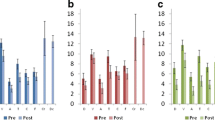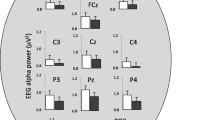Abstract
The ability to generate alpha brainwaves has been associated with the self-regulation of stress. It has been suggested that generation of these brainwaves, above what is to be expected in a normal 24-hour EEG, contributes to an expanded state of consciousness. This study attempted to test Newman's theory that expansion of consciousness could be observed in perception of time passing. Twenty female college students were randomly assigned to an alpha brainwave training or beta (mock) brainwave training group. Following ten 30-minute training sessions over a five-week period of time, each subject in each group was asked to produce ten randomly assigned time intervals. Mean scores were obtained for each of the ten intervals for each group. An analysis of variance with repeated measures was used to analyze the time interval perceptions of each group. According to results obtained, both main effects and interaction effects were highly significant (p<.0001). This study offers a beginning effort to examine the consciousness altering capability of alpha brain-wave generation.
Similar content being viewed by others
References
Alderson, M. J. (1974). Effect of increased body temperature on the perception of time.Nursing Research, 23, 42–49.
Alexander, T. (1969).Children and adolescents—a biocultural approach to psychological development. New York: Atherton Press.
Bentov, I. (1977).Stalking the wild pendulum. New York: Dutton.
Brown, B. (1977).Stress and the art of biofeedback. New York: Harper & Row.
Edmonston, W., & Grotevant, W. (1975). Hypnosis and alpha hypnosis and alpha density.The American Journal of Clinical Hypnosis, 17, 221–232.
Fraisse, P. (1963).The psychology of time. New York: Harper & Row.
Frankenhauser, M. (1959).Estimation of time. Stockholm: Almqvist & Wiksell.
Gannon, L., & Stemback, R. (1971). Alpha enhancement as a treatment for pain: A case study.Journal of Behavior, Therapy, and Experimental Psychiatry, 2, 209–213.
Goodman, L. S., & Gilman, A. (Eds.) (1975).Pharmacological basis of therapeutics (5th ed.). New York: MacMillan.
Green, A. M., & Green, E. E. (1974). The ins and outs of mind-body energy.Science Year, 137–147.
Green, A. M., & Green, E. E. (1975). Biofeedback research and therapy. In N.O. Jacobson (Ed.),New Ways to Health (pp. 1–10). Stokholm: Natur ock Kultur.
Green, A. M., & Green, E. E. (1983). General and specific applications of theramal biofeedback. In J.V. Basmajian (Ed.),Biofeedback principles and practice for clinicians (pp. 211–227). Baltimore: Williams & Wilkins.
Green, A. M., & Green, E. E. (1986). Biofeedback and states of consciousness. In B.B. Wilman & M. Ullman (Eds.),Handbook of states of consciousness (pp. 553–589). New York: Van Nostrand Reinhold.
Green, A. M., Green, E. E., & Norris, P. A. (1980). Self-regulation training for control of hypertension.Primary Cardiology, 6(3), 126–137.
Green, A. M., Green, E. E., & Walters, E. (1970). Voluntary control of internal states: Psychological physiological.Journal of Transpersonal Psychology, 2, 1–26.
Green, A. M. Green, E. E., & Walters, E. (1971, October).Biofeedback for mind-body self-regulation: Healing and creativity. Paper presented at the Symposium, “The Varieties of Healing Experience,” sponsored jointly by the Academy of Parapsychology and Medicine, Cupertino, California.
Green, A. M., Green, E. E., & Walters, E. (1974, February).Brainwave training, imagery, creativity and integrative experiences. Paper presented at the Biofeedback Research Society Conference, Topeka, Kansas.
Hawkes, G., Joy, R., & Evans, W. (1962). Autonomic effects on estimate of time: Evidence for a physiological correlate of temporal experience.Journal of Psychology, 53, 183–191.
Hoagland, J. (1933). The physiological control of judgments of duration: Evidence for a chemical clock.Journal of General Psychology, 9, 267–287.
Kamiya, J. (1962, April).Conditional discrimination of the EEG alpha rhythm in humans. Paper presented at the Western Psychological Association, San Francisco, California.
Kamiya, J. (1968). Conscious control of brainwaves.Psychology Today, 1, 57–60.
Kamiya, J. (1969). Operant control of the EEG alpha rhythm and some of its reported effects on consciousness. In C.T. Tart (Ed.),Altered states of consciousness (pp. 507–517). New York: John Wiley & Sons.
Legg, C. (1967).Metabolism, arousal, and subjective time. Unpublished doctoral disseration, Cambridge University, England.
Newman, M. (1982). Time as an index of expanding consciousness with age.Nursing Research, 31, 290–293.
Newman, M. (1986).Health as expanding consciousness. St. Louis: C.V. Mosby.
Nowlis, D., & Greenberg, N. (1979). Empirical description of effects of exercise on mood.Perceptual and Motor Skills, 49, 1001–1002.
Nowlis, D., & Kamiya, J. (1970). The control of electro-encephalographic alpha rhythms through auditory feedback and the associated mental activity.Psychophysiology, 1, 476–484.
Ornstein, R. (1969).On the experience of time. Baltimore: Penguin Books.
Pfaff, D. (1968). Effects of temperature and time of day on time judgments.Journal of Experimental Psychology, 76, 419–422.
Piaget, J., & Inhelder, B. (1967).The child's conception of space. New York: W.W. Norton.
Sheehan, G. (1978).Running and being the total experience. New York: Simon & Schuster.
Sill, J. S. (1980). Disengagement reconsidered: Awareness of finitude.Gerontologist, 20, 457–462.
Stephens, G., & Halberg, F. (1965). Human time estimation.Nursing Research, 14, 310–317.
Suter, S., & Dillingham, C. (1979). EEG alpha biofeedback and time perception.Perception and Motor Skills, 48, 698.
Wacker, M. (1987).A relationship between the alpha state and perception of time passing in a female college population. Unpublished doctoral dissertation, New York, University, New York.
Walrath, L., & Hamilton, D. (1975). Autonomic correlates of meditation and hypnosis.The American Journal of Clinical Hypnosis, 17, 190–197.
Woodruff, D. S., & Birren, J. E. (1972). Biofeedback conditioning of the EEG alpha rhythm in young and old subjects.Proceedings of the 80th Annual Convention of the American Psychological Association, 7, 673–674.
Author information
Authors and Affiliations
Additional information
The author wishes to acknowledge Dr. Alton J. DeLong for his generosity in reviewing this paper and offering such helpful support and suggestions.
Rights and permissions
About this article
Cite this article
Wacker, M.S. Alpha brainwave training and perception of time passing: Preliminary findings. Biofeedback and Self-Regulation 21, 303–309 (1996). https://doi.org/10.1007/BF02214430
Issue Date:
DOI: https://doi.org/10.1007/BF02214430




